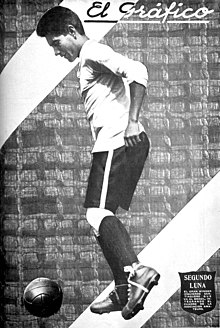 Segundo Luna in 1926 | |||
| Personal information | |||
|---|---|---|---|
| Full name | Segundo Nepomuceno Gómez | ||
| Date of birth | 20 April 1902 | ||
| Place of birth | Santiago del Estero, Argentina | ||
| Position(s) | Striker | ||
| Senior career* | |||
| Years | Team | Apps | ( Gls) |
| ?–1928 | Mitre | ||
| 1929–1930 | Newell's Old Boys | ||
| 1931 | Rosario Central | ||
| International career | |||
| 1927–1928 | Argentina | 7 | (3) |
| *Club domestic league appearances and goals | |||
| Medal record | ||
|---|---|---|
| Men's football | ||
| Representing | ||
| Olympic Games | ||
| 1928 Amsterdam | Team competition | |
Segundo Luna (born 20 April 1902) was an Argentine footballer, born in Santiago del Estero, Argentina. He was the first Santiagueño (person who was born in Santiago del Estero) to play in Argentina's national football team as well as the first to play in an international tournament. Luna's team finished second in the Athletic Club Students Cultural Football League. He then joined the international football team in 1927, the year before the Olympics in Amsterdam. His first tournament was the 1927 South American Championship, in Lima, Peru, where Argentina qualified for the 1928 Olympics. [1] The name 'Segundo Luna' means 'Second Moon' in Spanish.
The Copa De America
Segundo Luna scored his first international goal on 1 October 1927, against Bolivia. Luna scored the first goal after 18 minutes in what would be a 7–1 win. He scored another goal in that match, which was Argentina's sixth. This was after 56 minutes. He next scored on 20 November, in a 3–2 win against Uruguay. He scored his team's second goal (to make it 2–1) after 70 minutes. Luna was the joint-top goalscorer of the competition, along with Alfredo Carricaberry (Argentina), Roberto Figueroa (Uruguay), Héctor Scarone (Uruguay) and Pedro Petrone (Uruguay). They scored 3 goals each. [1] [2]
1928 Olympics
Argentina came second in the 1928 Olympics. Luna was part of the squad, but he did not play in any matches. [3] They played the semi-final against Egypt, who had surprisingly beaten Turkey and Portugal in earlier rounds. Luna's team were dominant and won 6–0. The final was against Uruguay and finished 1–1 after 30 minutes of extra time. A replay was called, and it was 1–1 at half time. Argentina conceded the tournament-winning goal in the 68th minute. [4]
References
- ^ a b Estudiantes.org Archived 10 September 2011 at the Wayback Machine
- ^ "1900-1930 in football". Recordfootball. September 2012. Retrieved 14 August 2013.
- ^ "Segundo Luna". Olympedia. Retrieved 11 September 2021.
- ^ Evans, Hilary; Gjerde, Arild; Heijmans, Jeroen; Mallon, Bill; et al. "Argentina Football at the 1928 Amsterdam Summer Games". Olympics at Sports-Reference.com. Sports Reference LLC. Archived from the original on 17 April 2020. Retrieved 14 August 2013.
- 1902 births
- Olympic footballers for Argentina
- Footballers at the 1928 Summer Olympics
- Olympic silver medalists for Argentina
- Olympic medalists in football
- Medalists at the 1928 Summer Olympics
- Argentine men's footballers
- Argentina men's international footballers
- Copa América-winning players
- Men's association football forwards
- Footballers from Santiago del Estero